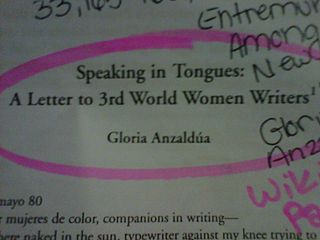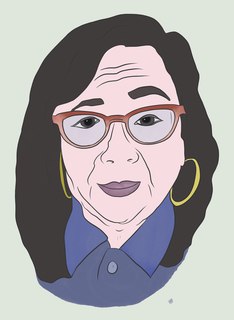Related Research Articles

Womanism is a social theory based on the history and everyday experiences of black women. It seeks, according to womanist scholar Layli Maparyan (Phillips), to "restore the balance between people and the environment/nature and reconcil[e] human life with the spiritual dimension". Writer Alice Walker coined the term "womanist" in a short story, "Coming Apart", in 1979. Since Walker's initial use, the term has evolved to envelop varied, and often opposing, interpretations of concepts such as feminism, men, and blackness.

Cherríe Moraga is a Chicana writer, feminist activist, poet, essayist, and playwright. She is part of the faculty at the University of California, Santa Barbara in the Department of English. Moraga is also a founding member of the social justice activist group La Red Chicana Indígena which is an organization of Chicanas fighting for education, culture rights, and Indigenous Rights.

Gloria Evangelina Anzaldúa was an American scholar of Chicana cultural theory, feminist theory, and queer theory. She loosely based her best-known book, Borderlands/La Frontera: The New Mestiza, on her life growing up on the Mexico–Texas border and incorporated her lifelong experiences of social and cultural marginalization into her work. She also developed theories about the marginal, in-between, and mixed cultures that develop along borders, including on the concepts of Nepantla, Coyoxaulqui imperative, new tribalism, and spiritual activism.
New tribalism is a theory by queer Chicana feminist Gloria E. Anzaldúa to disrupt the matrix of imposed identity categories that the hegemonic culture imposes on people in order to maintain its power and authority. Anzaldúa states that she "appropriated" and reused the term from David Rieff, who had "used it to criticize [her] for being 'a professional Aztec' and for what he saw as [her] naive and nostalgic return to indigenous roots." Rieff stated that Anzaldúa should "think a little less about race and a little more about class." In response, Anzaldúa developed the concept in order to form an inclusive social identity that "motivates subordinated communities to work together in coalition."
Chicana feminism is a sociopolitical movement in the United States that analyzes the historical, cultural, spiritual, educational, and economic intersections of women that identify as Chicana. Chicana feminism empowers women and insist that they challenge the stereotypes and boundaries that Chicanas face across lines of gender, ethnicity, race, class, and sexuality. Most importantly, Chicana feminism is a movement. It is also a theory and praxis that helps women reclaim their existence between and among the Chicano Movement and American feminist movements.
Rebecca Cox Jackson (1795–1871) was a free Black woman, best known for her religious feminism and activism and for her autobiography, Gifts of Power: The Writings of Rebecca Cox Jackson, Black Visionary, Shaker Eldress, which was published in 1981 and edited by Jean McMahon Humez. Jackson worked as a seamstress and cared for her brother's children until she had a religious awakening in 1830. She divorced her husband when he failed to teach her how to read and write, but gained literacy as one of the spiritual gifts she believed were given to her by God; these gifts also included healing people, seeing the future, having visions, hearing God's voice, and acting as a medium. After leaving her husband, she joined the Shaker movement, which shared her values of egalitarianism and celibacy. Jackson began writing her autobiography in 1830 and completed it in 1864, describing her womanist theology and feminism, visions, and other religious experiences, as well as her accounts of her experiences of sexism, racism, and discrimination. She and her protégé and lifelong companion Rebecca Perot founded a Shaker community of Black women in Philadelphia in 1859. Jackson's relationship with Perot, which lasted for 35 years until Jackson's death in 1871, has been called "perhaps the most controversial element of Jackson’s autobiography".

Conditions was a lesbian feminist literary magazine that came out biannually from 1976 to 1980 and annually from 1980 until 1990, and included poetry, prose, essays, book reviews, and interviews. It was founded in Brooklyn, New York, by Elly Bulkin, Jan Clausen, Irena Klepfisz and Rima Shore.

This Bridge Called My Back: Writings by Radical Women of Color is a feminist anthology edited by Cherríe Moraga and Gloria E. Anzaldúa, first published in 1981 by Persephone Press. The second edition was published in 1983 by Kitchen Table: Women of Color Press. The book's third edition was published by Third Woman Press until 2008, when it went out of print. In 2015, the fourth edition was published by State University of New York Press, Albany.

Borderlands/La Frontera: The New Mestiza is a 1987 semi-autobiographical work by Gloria E. Anzaldúa that examines the Chicano and Latino experience through the lens of issues such as gender, identity, race, and colonialism. Borderlands is considered to be Anzaldúa’s most well-known work and a pioneering piece of Chicana literature.
Norma Alarcón is a Chicana author and publisher in the United States. She is the founder of Third Woman Press and a major figure in Chicana feminism. She is Professor Emerita of Chicano/Latino Studies at the University of California, Berkeley.
Chicana literature is a form of literature that has emerged from the Chicana Feminist movement. It aims to redefine Chicana archetypes in an effort to provide positive models for Chicanas. Chicana writers redefine their relationships with what Gloria Anzaldúa has called "Las Tres Madres" of Mexican culture by depicting them as feminist sources of strength and compassion.

Speaking in Tongues: A Letter to 3rd World Women Writers is a letter written by Gloria E. Anzaldúa. The letter was drafted in 1979 and was published in Anzaldúa’s feminist anthology This Bridge Called My Back: Writings by Radical Women of Color (1981). Writing this essay in the format of a letter, Anzaldua urges the reader to “write from the body” and she connects her body to other bodies, creating a community of embodied people. This essay is addressed to women of color as she shows sympathy, encouragement, and words of wisdom towards them. The essay addresses women of color and encourages these women to make their personal, embodied experiences visible in the text. The reader must also allow the text to enter herself, if the reader chooses to enter the text.

Chela Sandoval, associate professor of Chicana Studies at University of California, Santa Barbara, is a noted theorist of postcolonial feminism and third world feminism. Beginning with her 1991 pioneering essay 'U.S. Third World Feminism: The Theory and Method of Oppositional Consciousness in the Postmodern World' Sandoval emerged as a significant voice for women of color and decolonial feminism.
Nepantla is a concept used in Chicano and Latino anthropology, social commentary, criticism, literature and art. It represents a concept of "in-between-ness." Nepantla is a Nahuatl word which means "in the middle of it" or "middle." It may refer specifically to the space between two figurative or literal bodies of water.

Sister Outsider: Essays and Speeches is a collection of essential essays and speeches written by Audre Lorde, a writer who focuses on the particulars of her identity: Black woman, lesbian, poet, activist, cancer survivor, mother, and feminist. This collection, now considered a classic volume of Lorde's most influential works of non-fiction prose, has had a groundbreaking impact in the development of contemporary feminist theories. In fifteen essays and speeches dating from 1976 to 1984, Lorde explores the complexities of intersectional identity, while explicitly drawing from her personal experiences of oppression to include sexism, heterosexism, racism, homophobia, classism, and ageism. The book examines a broad range of topics, including love, self-love, war, imperialism, police brutality, coalition building, violence against women, Black feminism, and movements towards equality that recognize and embrace differences as a vehicle for change. With meditative conscious reasoning, Lorde explores her misgivings for the widespread marginalization deeply-rooted in the United States' white patriarchal system, all the while, offering messages of hope. The essays in this landmark collection are extensively taught and have become a widespread area of academic analysis. Lorde's philosophical reasoning that recognizes oppressions as complex and interlocking designates her work as a significant contribution to critical social theory.
Queer of color critique is an intersectional framework, grounded in Black feminism, that challenges the single-issue approach to queer theory by analyzing how power dynamics associated race, class, gender expression, sexuality, ability, culture and nationality influence the lived experiences of individuals and groups that hold one or more of these identities. Incorporating the scholarship and writings of Audre Lorde, Gloria Anzaldúa, Kimberlé Crenshaw, Barbara Smith, Cathy Cohen, Brittney Cooper and Charlene A. Carruthers, the queer of color critique asks: what is queer about queer theory if we are analyzing sexuality as if it is removed from other identities? The queer of color critique expands queer politics and challenges queer activists to move out of a "single oppression framework" and incorporate the work and perspectives of differently marginalized identities into their politics, practices and organizations. The Combahee River Collective Statement clearly articulates the intersecting forces of power: "The most general statement of our politics at the present time would be that we are actively committed to struggling against racial, sexual, heterosexual, and class oppression, and see as our particular task the development of integrated analysis and practice based upon the fact that major systems of oppression are interlocking. The synthesis of these oppressions creates the conditions of our lives." Queer of color critique demands that an intersectional lens be applied queer politics and illustrates the limitations and contradictions of queer theory without it. Exercised by activists, organizers, intellectuals, care workers and community members alike, the queer of color critique imagines and builds a world in which all people can thrive as their most authentic selves- without sacrificing any part of their identity.
Andrea R Canaan is a Black feminist writer, speaker, community organizer, poet and activist.

The term Chicanafuturism was originated by scholar Catherine S. Ramírez which she introduced in Aztlán: A Journal of Chicano Studies in 2004. The term is a portmanteau of 'chicana' and 'futurism', inspired by the developing movement of Afrofuturism. The word 'chicana' refers to a woman or girl of Mexican origin or descent. However, 'Chicana' itself serves as a chosen identity for many female Mexican Americans in the United States, to express self-determination and solidarity in a shared cultural, ethnic, and communal identity while openly rejecting assimilation. Ramírez created the concept of Chicanafuturism as a response to white androcentrism that she felt permeated science-fiction and American society. Chicanafuturism can be understood as part of a larger genre of Latino futurisms.
Spiritual activism is a practice that brings together the otherworldly and inward-focused work of spirituality and the outwardly-focused work of activism. Spiritual activism asserts that these two practices are inseparable and calls for a recognition that the binaries of inward/outward, spiritual/material, and personal/political all form part of a larger interconnected whole between and among all living things. In an essay on queer Chicana feminist and theorist Gloria E. Anzaldúa's reflections on spiritual activist practice, AnaLouise Keating states that "spiritual activism is spirituality for social change, spirituality that posits a relational worldview and uses this holistic worldview to transform one's self and one's worlds."

The Coyolxauhqui imperative is a theory named after the Aztec goddess of the moon Coyolxauhqui to explain an ongoing and lifelong process of healing from events which fragment, dismember, or deeply wound the self spiritually, emotionally, and psychologically. The imperative is the need to look at the wounds, understand how the self has been fragmented, and then reconstruct or remake the self in a new way. Repeatedly enacting this process is done in the search for wholeness or integration. The concept was developed by queer Chicana feminist Gloria E. Anzaldúa.
References
- 1 2 "AnaLouise Keating, Ph.D. - Multicultural Women's and Gender Studies - Texas Woman's University". www.twu.edu. Retrieved 2017-05-16.